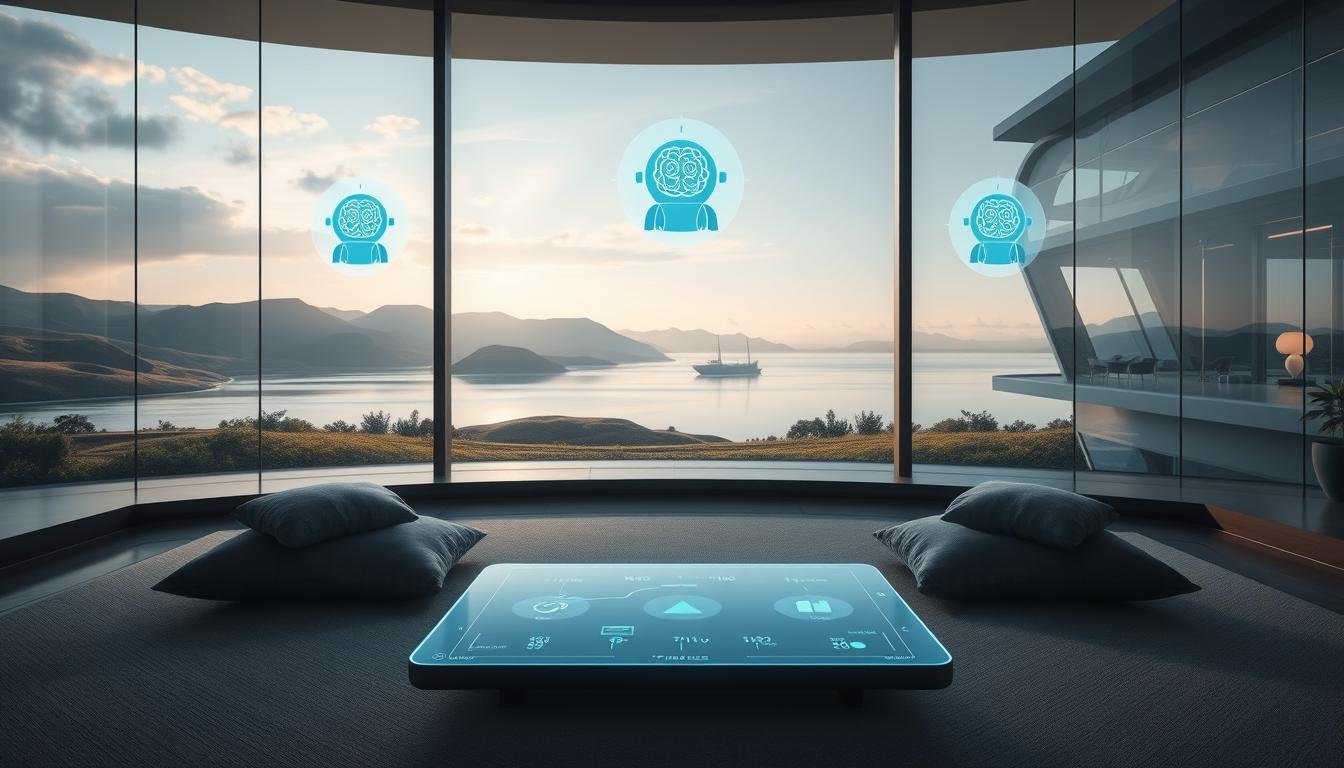Unlock Mindfulness with AI-Guided Training
In today’s fast-paced world, stress is an unwelcome companion for many. The intersection of artificial intelligence and mindfulness practices is revolutionizing the way we approach meditation and mental wellness.
According to a recent survey, only 12% of organizations have begun integrating AI into their mindfulness training delivery, indicating significant growth potential. AI-guided mindfulness training offers innovative ways to make meditation more accessible and personalized for practitioners of all levels.
As modern technology transforms traditional mindfulness practices, it provides customized guidance that adapts to individual needs and progress. This development is crucial in addressing the growing stress epidemic and making meditation a part of daily routines.
Key Takeaways
- Innovative AI technology is making mindfulness practices more accessible.
- Personalized meditation guidance is now available through AI integration.
- The use of AI in mindfulness training is still in its early stages.
- Customized mindfulness practices can help reduce stress.
- AI-guided training offers new ways to incorporate meditation into daily life.
The Evolution of AI-Guided Mindfulness Training
The integration of AI in mindfulness training is revolutionizing the way we approach meditation. By combining artificial intelligence algorithms with traditional mindfulness practices, we can create more responsive and adaptive mindfulness experiences.
What is AI-Guided Mindfulness?
AI-guided mindfulness represents a cutting-edge approach to meditation and mindfulness practices. It utilizes machine learning to understand user patterns, preferences, and progress, delivering increasingly personalized mindfulness practices over time. This technology has the potential to transform the way we engage with meditation, making it more accessible and effective.
Current Adoption Rates and Trends
A recent survey indicates that while AI adoption in mindfulness training is still relatively low at 12%, there is significant interest in its potential applications. The majority of respondents expect AI usage to increase significantly over the next 12 months, believing further incorporation will be beneficial for their organizations. This trend suggests a growing recognition of the value AI can bring to mindfulness practices.

The Intersection of Technology and Mindfulness
The evolution of mindfulness tools has progressed from in-person instruction to audio recordings, mobile apps, and now to AI systems that can generate custom meditation scripts and interactive experiences. Despite initial hesitation, many mindfulness practitioners are discovering that technology and meditation can complement each other when implemented thoughtfully, enhancing the overall experience.
Benefits of AI-Enhanced Meditation Practices

AI is redefining meditation practices by offering personalized mindfulness experiences. This integration has led to numerous benefits, transforming the way individuals approach mindfulness and meditation.
Personalized Mindfulness Experiences
AI-enhanced meditation practices offer unprecedented levels of personalization, adapting to individual preferences, experience levels, and specific stress management needs. The technology analyzes user responses and adjusts mindfulness content in real-time, creating a more effective and engaging practice tailored to each person’s unique journey.
Accessibility and Convenience Factors
The accessibility of mindfulness practices is dramatically improved as AI-guided meditation removes barriers of time, location, and cost. This convenience allows users to maintain consistent meditation practices, which is crucial for experiencing the full benefits of mindfulness.
Consistency and Progress Tracking
Progress tracking features enable practitioners to visualize their meditation journey, identifying patterns and improvements in their mindfulness practice over time. The convenience of having an AI meditation guide available 24/7 helps users establish consistent routines, making meditation more relevant to daily life challenges and reducing stress.
Practical Applications of AI in Mindfulness
The application of AI in mindfulness is transforming the landscape of meditation practices. AI is being utilized to create more personalized, accessible, and effective mindfulness experiences.
AI-Generated Guided Meditation Scripts
AI systems can generate guided meditation scripts tailored to specific needs, such as stress reduction or focus enhancement. This creates personalized audio experiences that feel custom-made, catering to individual preferences and goals.
Interactive Mindfulness Exercises and Activities
Interactive mindfulness exercises powered by AI can respond to user input, creating dynamic meditation sessions. These sessions adapt based on feedback about comfort, focus levels, and emotional states, ensuring a more engaging and effective practice.

Stress Management Tools for Various Settings
AI mindfulness tools are being implemented in various settings to help manage stress and improve overall wellbeing.
Workplace Applications
In workplace settings, AI mindfulness tools are helping employees manage stress, improve focus, and enhance overall wellbeing through short, targeted meditation sessions.
Educational Settings
Educational institutions are exploring AI-generated mindfulness practices for students, addressing specific challenges like test anxiety or difficulty concentrating. Teachers are using AI tools to create customized mindfulness practices that can be adapted for students with diverse needs.
Adapting Practices for Individual Needs
AI can help practitioners adapt traditional mindfulness practices for specific conditions like anxiety, depression, or chronic pain by emphasizing relevant techniques. This enables the creation of progressive mindfulness journeys that evolve as the practitioner develops greater awareness and skill in meditation techniques.
By leveraging AI, individuals can enjoy a more tailored approach to mindfulness, enhancing their meditation practice and overall mental wellbeing.
Balancing Technology and Human Connection in Mindfulness
As we explore the intersection of AI and mindfulness, it becomes clear that finding a balance between technology and human connection is crucial. While AI offers numerous benefits for mindfulness practices, many practitioners express valid concerns about losing the human element that has traditionally been central to meditation instruction.
The ethical considerations of AI-guided mindfulness include questions about authenticity, the role of human connection in spiritual growth, and the potential commodification of ancient wisdom traditions. To address these concerns, many organizations are adopting hybrid approaches where AI provides consistent daily guidance while human teachers offer deeper insights, community connection, and personalized feedback.
Research comparing AI-generated and human-led mindfulness sessions reveals both similarities and differences in effectiveness for stress reduction and building mindfulness skills. The most successful implementations of AI in mindfulness practices recognize the technology’s limitations and deliberately preserve spaces for human connection, embodied presence, and community practice.
Ultimately, personal discernment becomes essential, with practitioners learning to recognize when technology enhances their mindfulness experience and when it might be creating subtle barriers to presence and authenticity. By using AI as a supportive tool that enhances rather than replaces human-led practice, we can harness the benefits of technology while honoring the deeply human nature of meditation traditions.
FAQ
What are the benefits of using AI-enhanced meditation practices?
AI-enhanced meditation practices offer personalized experiences, tailored to individual needs, and provide accessibility and convenience. They also enable consistency and progress tracking, helping users stay on their mindfulness journey.
How do AI-generated guided meditation scripts work?
AI-generated guided meditation scripts use complex algorithms to create unique and adaptive meditation experiences. These scripts can be tailored to specific goals, such as stress management or relaxation, and can be adjusted based on user feedback.
Can AI-guided meditation practices be used in various settings?
Yes, AI-guided meditation practices can be used in a variety of settings, including at home, in the office, or during travel. They offer flexibility and can be adapted to suit different lifestyles and needs.
How do AI-enhanced mindfulness tools help with stress management?
AI-enhanced mindfulness tools provide effective stress management techniques, such as breathing exercises and meditation practices, which can be used to reduce stress and anxiety. These tools can be used in real-time, providing immediate relief.
Can AI-guided mindfulness practices be tailored to individual needs?
Yes, AI-guided mindfulness practices can be tailored to individual needs, taking into account factors such as goals, preferences, and progress. This personalized approach helps users achieve their mindfulness goals more effectively.
Share this content:




Post Comment